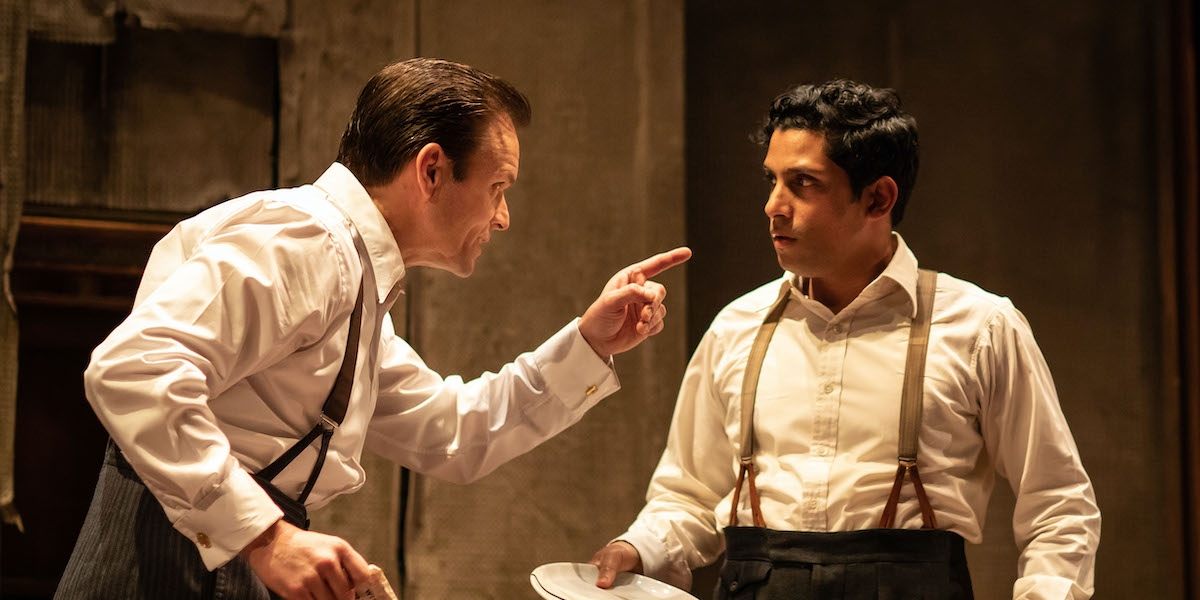Hampstead Theatre management and staff deserve full marks for securing a safe auditorium in the current Covid-19 pandemic. The theatre follows the government’s health and safety regulations to the letter – distancing, masks, sanitizers as well as special ventilation to purify the air. I felt much safer there than visiting any of the leading supermarkets.
Premiered in 1960 as part of Hampstead Theatre Club’s inaugural season, it was a hit that propelled the unknown 30-year-old Pinter to fame. The show was afterwards transferred to the prestigious Royal Court.
The Dumb Waiter seems a befitting play for a period of uncertainty, as the current lockdowns mirror the core of the play, as Pinter himself put it to its first director, James Roose-Evans ‘what I am interested in is: Suppose you and I were locked together in a cell what would happen to us?’.
The storyline seems neat and integrated. Those familiar with Ernest Hemingway’s short story, The Killers, published some 30 years earlier, will be forgiven for noting the similarities. Yet Pinter’s play is laden with dramatic tension that rears its head in and in between the dialogues and monologues. Alice Hamilton’s production offers something of the subtext of the growing anxiety and nervousness of the protagonists in the basement, but that seems to be derived from the physical movement of the actors rather than inner intensity generated by pauses. That might be attributed to the bizarre reality where the audience has been reduced to a minimum and everyone is wearing a mask, so the instant feedback from the audience, such as laughter or gasping, is absent.
Set in a café-restaurant basement, two hitmen, Gus (Shane Zaza) and Ben (Alec Newman) are killing time, waiting, for instruction from one Wilson, a sort of a malign Godot, to name their next victim. The audience can see what is happening but like the characters, Gus and Ben, cannot fathom the meaning or reasons behind the acquisition of some the bizarre items, like a plain envelope containing 12 matches.
Gus, the junior of the two, is restless and keeps complaining. He asks questions touching on mundane and also on all-important ethical issues, relating to their violent occupation. It is the noisy appearance of the unexpected third muted ‘character ‘, the dumb waiter, with inexplicable orders for exotic dishes, that unnerve the hitmen. The duo can cope with orders to kill but utterly confused but unnerved by requests for food. A note stating ‘Macaroni Pastitsio. Ormitha Macarounada’ get them flustered as they are unable to understand it (Pinter made up the second part of the name of the dish), arguing about what is needed to be done to carry out the ‘order’. Zaza and Newman tease out some of the humour. They successfully unmask the empty shell covered by their formal neat clothes and braces. In Hamilton’s production, the hitmen are merely marionettes with guns. Take the gun away and you are faced with a broken man, hence the ending in this production is as puzzling to the audience as it is to the characters themselves.
The set designed by James Perkins’s design of an octagonal grey basement room, with three sections of the concrete-grey mouldy wall exposed and two iron-framed single beds, creates a suitable for this unfolding drama.
A great effort has been made by all those involved in staging this drama and it is definitely worthy of your patronage.

